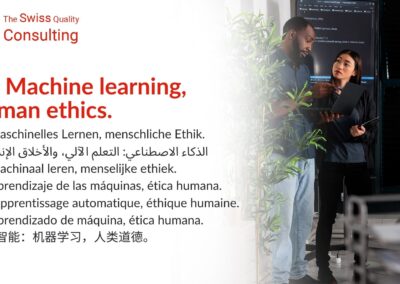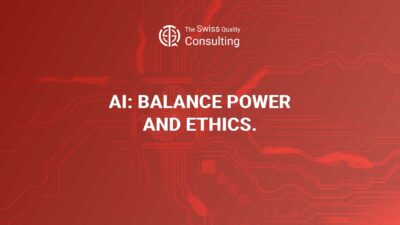The Role of Collaboration in Addressing Ethical Challenges
The Importance of Collaboration in Digital Ethics
Collaboration in digital ethics is essential for fostering partnerships between stakeholders to address ethical challenges and promote responsible technology use. In regions like Saudi Arabia and the UAE, where technological advancements are rapidly shaping business and society, the need for ethical guidelines and frameworks has never been more critical. Collaborative efforts between governments, businesses, academic institutions, and civil society can ensure that technology is developed and used in ways that respect individual rights and promote the common good.
Incorporating digital ethics into the development and deployment of technologies such as artificial intelligence, blockchain, and the metaverse requires a concerted effort from diverse stakeholders. For instance, AI algorithms must be transparent, fair, and free from bias. Achieving this requires input from AI developers, ethicists, legal experts, and users. In Riyadh and Dubai, where the adoption of AI is accelerating, such collaboration ensures that AI systems are designed and implemented ethically.
Blockchain technology, known for its transparency and security, also poses ethical challenges. For example, ensuring data privacy while maintaining transparency requires a delicate balance. In the UAE and Saudi Arabia, collaborative efforts between technology developers, regulators, and privacy advocates can create robust frameworks that protect user data without stifling innovation. By fostering a culture of collaboration in digital ethics, these regions can lead the way in responsible technology use.
Building Partnerships for Ethical Technology Use
Effective collaboration in digital ethics involves building strong partnerships between various stakeholders. In Saudi Arabia and the UAE, governments play a crucial role in setting the regulatory framework for ethical technology use. By working closely with businesses, academic institutions, and civil society, governments can develop policies that promote ethical practices while encouraging innovation. These partnerships ensure that ethical considerations are integrated into the technology development lifecycle from the outset.
One successful example of such collaboration is the establishment of ethical AI councils or committees. These bodies, comprising experts from diverse fields, provide guidance on the ethical implications of AI technologies. In Dubai, for instance, the government has partnered with leading universities and tech companies to create an AI ethics council. This council reviews AI projects and provides recommendations to ensure they adhere to ethical standards. Such initiatives demonstrate the power of collaboration in promoting responsible technology use.
Furthermore, partnerships between businesses and academic institutions can drive research on digital ethics and develop best practices. For example, universities in Riyadh and Dubai can collaborate with tech companies to conduct research on the ethical implications of emerging technologies. By sharing knowledge and resources, these partnerships can produce valuable insights that inform policy and practice. This collaborative approach ensures that ethical considerations keep pace with technological advancements.
Promoting Responsible Technology Use through Education and Training
Education and training are vital components of promoting responsible technology use. In Saudi Arabia and the UAE, educational institutions play a crucial role in raising awareness of digital ethics among future technologists, business leaders, and policymakers. Integrating digital ethics into the curriculum ensures that students understand the ethical implications of technology and are equipped to address them in their careers.
For technologists, specialized training programs can provide the skills and knowledge needed to develop ethical technologies. For example, AI developers can benefit from training on bias detection and mitigation, ensuring their algorithms are fair and transparent. In Riyadh and Dubai, where the tech industry is booming, such training programs can help create a workforce that is proficient in both technology and ethics.
Executive coaching services can also play a significant role in promoting responsible technology use among business leaders. By understanding the principles of digital ethics, executives can make informed decisions that align with ethical standards. In the competitive business environments of Saudi Arabia and the UAE, ethical leadership can enhance corporate reputation and drive long-term success. By investing in education and training, these regions can foster a culture of responsible technology use that benefits society as a whole.
Implementing Collaborative Strategies for Ethical Technology
Engaging Stakeholders in Ethical Policymaking
Engaging a wide range of stakeholders in ethical policymaking is essential for developing comprehensive and effective digital ethics regulations. In Saudi Arabia and the UAE, this involves including government officials, technologists, ethicists, legal experts, and representatives from civil society in the policymaking process. By fostering an inclusive approach, policymakers can ensure that regulations reflect the diverse perspectives and needs of the community.
Stakeholder engagement can take various forms, such as public consultations, advisory committees, and collaborative workshops. These platforms provide opportunities for stakeholders to share their insights, concerns, and recommendations, helping to shape policies that promote ethical technology use. In Riyadh and Dubai, where public-private partnerships are common, such collaborative efforts can enhance the effectiveness and legitimacy of digital ethics regulations.
Ongoing dialogue with stakeholders is also crucial for adapting regulations to the rapidly evolving technological landscape. As new technologies emerge, regulations must be updated to address new ethical challenges. By maintaining open lines of communication with stakeholders, policymakers in the UAE and Saudi Arabia can ensure their regulations remain relevant and effective in promoting digital ethics.
Monitoring and Enforcing Ethical Standards
Effective monitoring and enforcement mechanisms are critical for ensuring compliance with digital ethics regulations. In Saudi Arabia and the UAE, robust oversight frameworks can help detect and address unethical practices, ensuring that regulations have a meaningful impact. These frameworks should include clear guidelines for compliance, regular audits, and mechanisms for reporting and addressing violations.
Regulatory bodies in Riyadh and Dubai can play a key role in monitoring compliance with digital ethics regulations. These bodies can conduct regular assessments of AI, blockchain, and other technology deployments to ensure they adhere to ethical standards. By identifying and addressing non-compliance, regulatory bodies can deter unethical practices and promote a culture of accountability.
Enforcement mechanisms should also include provisions for transparency and public accountability. By publishing reports on compliance and enforcement actions, regulatory bodies can enhance public trust in the regulatory process. Additionally, providing avenues for public feedback and complaints can help identify areas for improvement and ensure that regulations remain responsive to the needs of the community.
Future Directions for Collaborative Digital Ethics
The future of collaborative digital ethics in Saudi Arabia and the UAE looks promising, with significant potential for growth and innovation. As these regions continue to invest in technological advancements, the demand for integrated solutions that leverage the strengths of multiple disciplines will only grow. Business executives and entrepreneurs must recognize the value of such collaborations and actively foster environments that encourage cross-disciplinary teamwork.
One emerging trend is the increasing involvement of data scientists in multidisciplinary teams. With the growing importance of data in AI and blockchain, data scientists play a crucial role in analyzing and interpreting large datasets to improve the performance and reliability of technology applications. Their expertise in machine learning and data analytics complements the skills of AI researchers and blockchain developers, leading to more robust and intelligent solutions.
Moreover, the rise of generative artificial intelligence presents new opportunities for collaborative digital ethics. Generative AI can be used to design and simulate technology applications, reducing the time and cost associated with prototyping and testing. By incorporating generative AI into their workflows, multidisciplinary teams can accelerate the development of innovative solutions and bring them to market more quickly. In regions like Riyadh and Dubai, where the pace of technological change is rapid, such advancements are particularly valuable.
Conclusion: The Path Forward for Digital Ethics
The integration of digital ethics into technological practices is essential for ensuring that advancements in AI, blockchain, and other modern technologies are used responsibly and ethically. In regions like Saudi Arabia and the UAE, where technological innovation is rapidly advancing, fostering collaboration in digital ethics is crucial for protecting individuals and promoting sustainable growth.
By engaging stakeholders, promoting education and training, and implementing robust monitoring and enforcement mechanisms, policymakers in Riyadh and Dubai can create a regulatory environment that fosters ethical technology use. These efforts not only protect individuals from unethical practices but also enhance public trust in technology, paving the way for continued progress and development.
As the technological landscape continues to evolve, the commitment to digital ethics must remain strong. By prioritizing ethical considerations in technology development and use, Saudi Arabia and the UAE can lead the way in creating a future where technology serves the greater good and contributes to a more just and equitable society.
—
#CollaborationInDigitalEthics, #EthicalTechnology, #AI, #Blockchain, #Metaverse, #ExecutiveCoaching, #SaudiArabia, #UAE, #Riyadh, #Dubai























